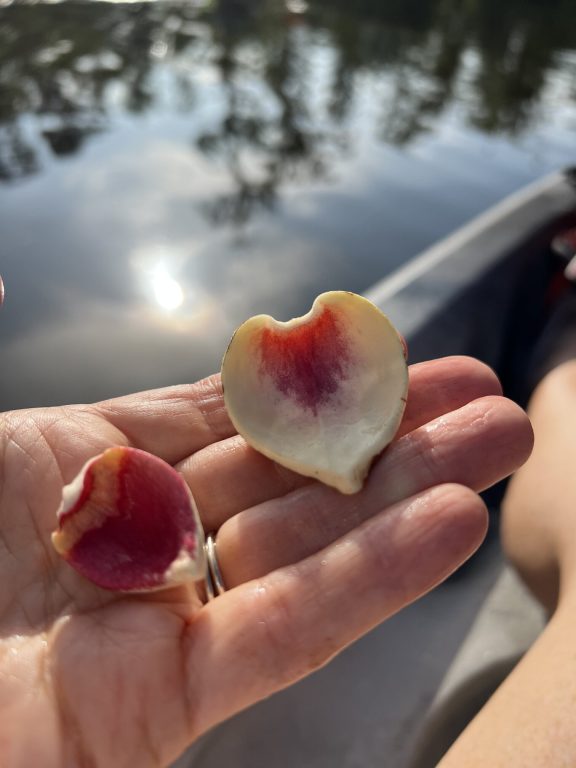
by Linda Lee
When someone we love is hurting, ill, or otherwise struggling, our first instinct may be to jump in to try to fix the problem or to take over a task the person has difficulty executing. We want to make their lives easier, and these seem like logical ways. I learned many things after my spouse’s death that I wish I had known before. One is that these loving attempts may not honor where our dear ones are on their journey.
Suppressing Our Desire to Fix the Challenges
I would like to illustrate this concept with some examples from my life. My spouse, Carol, and I always took care of our yard together. When her health began to decline, she started to do her tasks in shorter increments, still determined to participate. She always pushed herself hard, but she finally had to give them up.
Carol then started going to the gym twice daily to walk the treadmill. She knew this would help maintain her strength. Some days, she would return to the house with a big grin, proudly announcing, “I kicked butt!” Those celebrations became fewer, and she started having trouble walking across the park-like expanse dividing the parking lot from the gym facility. One day, she was midway to the car and thought she couldn’t make it there. No one was around to call for help or lean on for support. She willed herself to get to the car but was scared and shaken. She ended her recount of the experience with, “I guess that part of my life is over.”
I empathized with these and other losses, but I look back on them now and realize I mainly tried to comfort her with a fix. For example, I said, “It’s okay; I can take over edging the grass. We’ll still be able to maintain our yard.” Or, “We’ll buy a treadmill so you can walk at home. Then, you won’t need to go to the gym.” I’ll never forget the look of disappointment on her face when I made that suggestion. What had I done wrong?
In an interview for the Endwell Project Organization, Frank Ostaseski, an end-of-life care specialist and hospice founder, told a story that immediately made me see my error.[1] One of the patients at his hospice center had lost some ability to maneuver his hand accurately. He knocked over his glass of milk in Mr. Ostaseski’s presence.
Before you read on, please think about what your immediate reaction would have been if you were the staff member or caregiver.
My response would have been to reassure him, “That’s all right; it’s no big deal. I can clean this up.” Would you have said something similar? That’s also what Mr. Ostaseski said, thinking it would downplay the situation and keep the patient from being upset.
Mr. Ostaseski was startled when the patient screamed, “It is a goddamn big deal!” The author points out that these seemingly unimportant moments remind us of our limitations and cause us to see the fragility of our lives.
I wish I had spent more time acknowledging Carol’s losses as she brought them up. She didn’t need me to fix things. She needed me to realize and fully appreciate that each change was a BIG DEAL. She needed me to listen to her reaction to the problem and its effect on her life—to understand its pain. Only then could we problem-solve how we could move forward.
The number of Carol’s losses increased with time. They included her abilities to travel, shop, drive, cook, hug, shower, walk, stand, breathe without supplemental oxygen, and many more. They were huge, progressive diminutions of a strong, vibrant, energetic, independent woman. It broke my heart to watch it happen. I can only imagine how devastating it was for her.
Several times, Carol expressed concerns that she was holding me back or becoming a burden. It was difficult to reassure her that this was not the case. People may feel less lovable when they’re ill or injured and can no longer function in familiar roles. I suspect we all have felt this to some degree, even during minor illnesses. We may see our reflection in the mirror while we’re sick and hate how we look; we may feel old or crabby and out-of-sorts. Those feelings must be greatly compounded during a chronic or end-stage disease. By listening to and acknowledging our loved one’s feelings, we allow them to be heard and supported, and we show them they are loved.
Suppressing Our Desire to Take Over
If we see our loved ones struggling to pull on a shirt, get a spoonful of food to their mouths, or reach for a magazine on a shelf, our instinct may be to step in to do the task for them. However, we need to realize that doing so takes away some of their power and independence. If they are capable of the activity, despite being slower or less accurate than they were previously, allowing them to accomplish it may give them a sense of satisfaction and achievement. If they’re truly having difficulty with the task, we can ask them if they would like assistance and then follow their lead. This empowers them by giving them choice.
Similarly, finding ways for our loved ones to participate in the activities of daily life may keep them engaged. For instance, if those with limitations (including dementia) want to help prepare a meal, perhaps they can do something like wash the lettuce, even if it takes 20 minutes to do it as they repeatedly wash one leaf at a time. Yes, it may be more efficient and easier for the caregiver to do such tasks. But allowing our loved ones to participate honors them as people and recognizes their continued contributions to the family and daily life.
Letting Go of Some Control
Staying out of fix-it or do-it-for-you modes shifts the care giver into the role of care partner, and this is hard! However, we are then walking beside our loved ones as they go on this journey, rather than taking the lead. As we share decisions and responsibilities, the balance may shift for both the person who is being cared for and the caregiver. It takes courage and patience for the caregiver to give up some control, but wouldn’t we each want a say in our own response to illness or injury?
Making the shift from caregiver to care partner may remove some of our angst and burden as decisions and activities are shared. This is not to downplay the challenge of caring for someone. The caregiving/care-partnering role is an all-encompassing, amazing gift of self. We must remember to be gentle on ourselves as we support others. The next article in this series will address the toll caregiving takes on the individual and suggest possible ways to find balance in life.
Being a care partner is a balancing act that will change with time if our loved ones become less capable of participating. However, the benefit is knowing that we are honoring their wishes, showing them the respect they deserve as human beings, and supporting them in living life as fully as possible.

This is the second installment in a series of articles Linda is writing for caregivers and family and friends who wish to support them.
Read the first installment HERE. | Read the third installment HERE.
Linda Lee, PhD, is a published author and retired professor and research editor. She has offered workshops for The Yoga Sanctuary and other organizations, including Tidewell Hospice. In this series, she will present guidelines she developed following the loss of her spouse, through her training as a Tidewell volunteer, and from the grief literature.
_________________________________________________________________________
[1] Frank Ostaseski, “The Paradox of Vulnerability,” ENDWELL Project Organization Symposium interview, December 23, 2019, https://endwellproject.org/watch/frank-ostaseski-the-paradox-of-vulnerability/.
